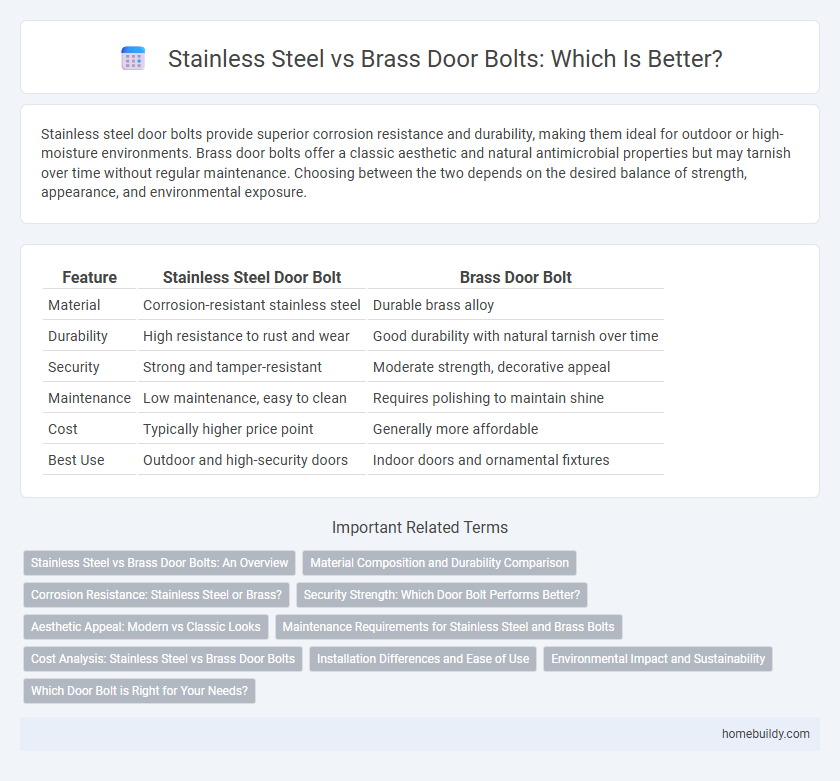Stainless steel door bolts provide superior corrosion resistance and durability, making them ideal for outdoor or high-moisture environments. Brass door bolts offer a classic aesthetic and natural antimicrobial properties but may tarnish over time without regular maintenance. Choosing between the two depends on the desired balance of strength, appearance, and environmental exposure.
Table of Comparison
| Feature | Stainless Steel Door Bolt | Brass Door Bolt |
|---|---|---|
| Material | Corrosion-resistant stainless steel | Durable brass alloy |
| Durability | High resistance to rust and wear | Good durability with natural tarnish over time |
| Security | Strong and tamper-resistant | Moderate strength, decorative appeal |
| Maintenance | Low maintenance, easy to clean | Requires polishing to maintain shine |
| Cost | Typically higher price point | Generally more affordable |
| Best Use | Outdoor and high-security doors | Indoor doors and ornamental fixtures |
Stainless Steel vs Brass Door Bolts: An Overview
Stainless steel door bolts offer superior corrosion resistance and durability compared to brass door bolts, making them ideal for outdoor and high-moisture environments. Brass door bolts provide a classic aesthetic and good resistance to tarnishing but are softer and more prone to wear over time. Choosing between stainless steel and brass door bolts depends on the required strength, environmental exposure, and desired finish longevity.
Material Composition and Durability Comparison
Stainless steel door bolts are composed primarily of iron alloyed with chromium, providing exceptional resistance to corrosion, rust, and wear, making them ideal for outdoor or high-moisture environments. Brass door bolts, made from a copper and zinc alloy, offer moderate corrosion resistance and a classic aesthetic but are generally softer and more prone to wear and deformation over time. In terms of durability, stainless steel bolts outperform brass counterparts due to their superior strength and longevity in demanding conditions.
Corrosion Resistance: Stainless Steel or Brass?
Stainless steel door bolts offer superior corrosion resistance due to their chromium content, which forms a passive oxide layer protecting against rust and environmental damage. Brass door bolts, while naturally resistant to corrosion because of their copper and zinc alloy composition, are more susceptible to tarnishing and may degrade in highly acidic or saline environments. For applications requiring long-term durability in harsh conditions, stainless steel door bolts are generally the preferred choice.
Security Strength: Which Door Bolt Performs Better?
Stainless steel door bolts offer superior security strength due to their high resistance to corrosion, impact, and tampering, making them ideal for exterior doors exposed to harsh weather conditions. Brass door bolts provide moderate durability but are softer and more prone to wear, making them less effective against forced entry attempts. For enhanced protection against break-ins, stainless steel door bolts are the preferred choice, combining robustness with long-lasting performance.
Aesthetic Appeal: Modern vs Classic Looks
Stainless steel door bolts offer a sleek, modern aesthetic with a polished or matte finish that complements contemporary interior designs and minimalist architecture. Brass door bolts provide a classic, timeless look with their warm golden tones and natural patina that enhances traditional or vintage decor. Choosing between stainless steel and brass door bolts depends on the desired style, with stainless steel favored for modern, industrial settings and brass preferred for elegant, historic-inspired environments.
Maintenance Requirements for Stainless Steel and Brass Bolts
Stainless steel door bolts require minimal maintenance due to their corrosion resistance and durability, making them ideal for outdoor or high-humidity environments. Brass door bolts, while aesthetically pleasing and resistant to tarnish, need regular polishing and cleaning to maintain their appearance and prevent oxidation. Proper upkeep of brass bolts involves applying protective coatings, whereas stainless steel bolts typically remain functional and visually appealing with occasional cleaning.
Cost Analysis: Stainless Steel vs Brass Door Bolts
Stainless steel door bolts generally cost more upfront than brass door bolts due to higher material and manufacturing expenses. However, stainless steel offers superior corrosion resistance and durability, which can lead to lower maintenance and replacement costs over time. Brass door bolts are more affordable initially but may require frequent upkeep or replacement in harsh environments, potentially increasing long-term expenses.
Installation Differences and Ease of Use
Stainless steel door bolts require precise alignment during installation to prevent corrosion and ensure long-term durability, while brass door bolts are more forgiving in fitting but may tarnish over time. Installation of stainless steel bolts often involves using corrosion-resistant screws and tools designed for harder materials, whereas brass bolts can be installed with standard hardware. Ease of use favors stainless steel bolts due to their rigidity and resistance to wear, providing smoother operation compared to softer brass bolts that may deform under frequent use.
Environmental Impact and Sustainability
Stainless steel door bolts offer superior environmental sustainability due to their high recyclability and longer lifespan, reducing the frequency of replacement and waste. Brass door bolts, while durable, require more intensive mining and energy in extraction processes, resulting in higher carbon emissions and environmental degradation. Choosing stainless steel door bolts supports eco-friendly building practices by minimizing resource depletion and promoting material reuse.
Which Door Bolt is Right for Your Needs?
Stainless steel door bolts offer superior corrosion resistance and durability, making them ideal for outdoor or high-moisture environments, while brass door bolts provide an attractive finish and naturally resist rust, suitable for decorative interior applications. When deciding the right door bolt, consider factors like exposure to weather, aesthetic preferences, and maintenance requirements. Stainless steel excels in strength and longevity, whereas brass combines functionality with a classic look for less demanding conditions.
Stainless steel door bolt vs brass door bolt Infographic

 homebuildy.com
homebuildy.com